七下 unit 6 I'm watching TV. Section A Grammar-3c(共23张PPT)
文档属性
| 名称 | 七下 unit 6 I'm watching TV. Section A Grammar-3c(共23张PPT) | 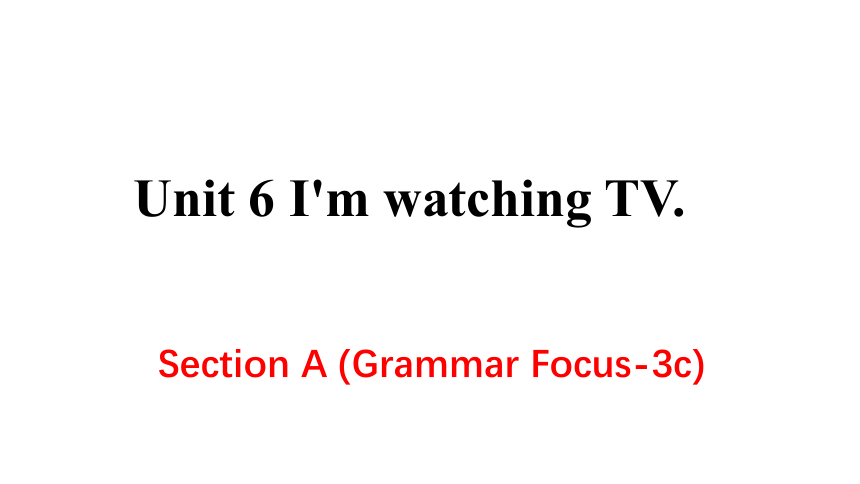 | |
| 格式 | zip | ||
| 文件大小 | 4.5MB | ||
| 资源类型 | 教案 | ||
| 版本资源 | 人教新目标(Go for it)版 | ||
| 科目 | 英语 | ||
| 更新时间 | 2023-04-06 16:31:40 | ||
图片预览


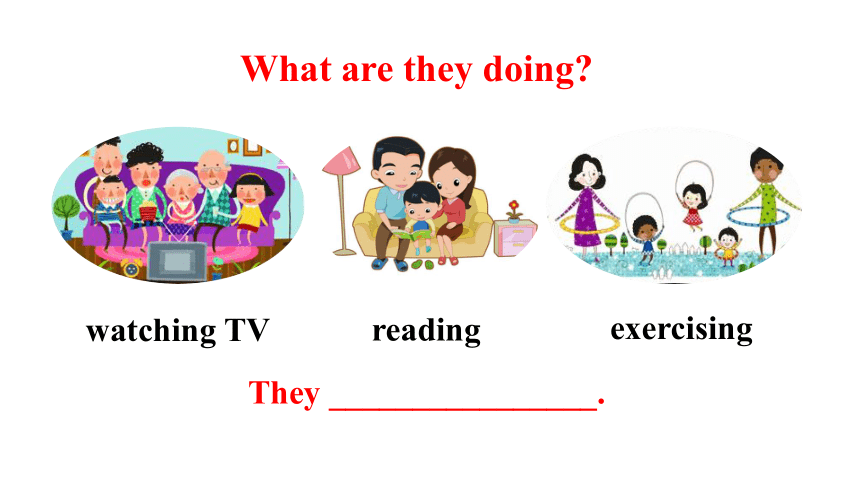
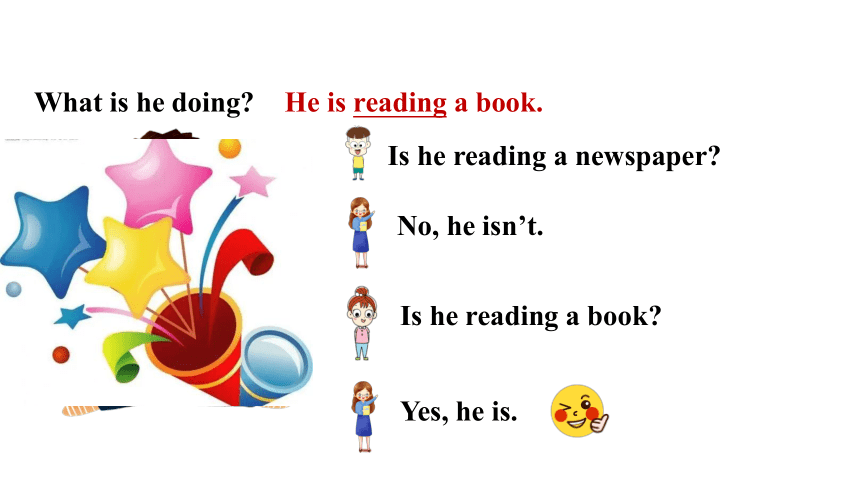
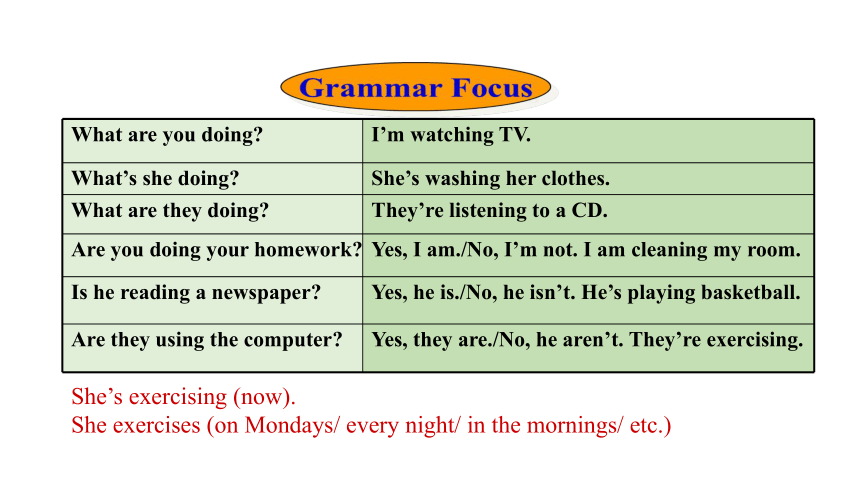
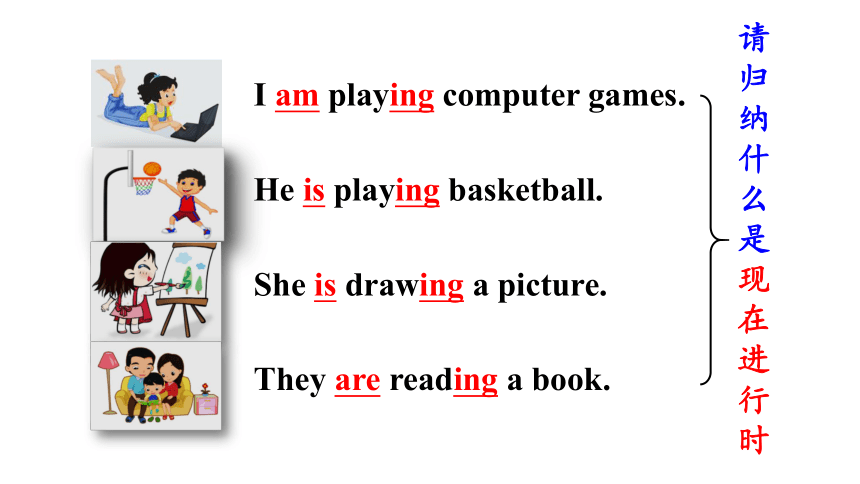
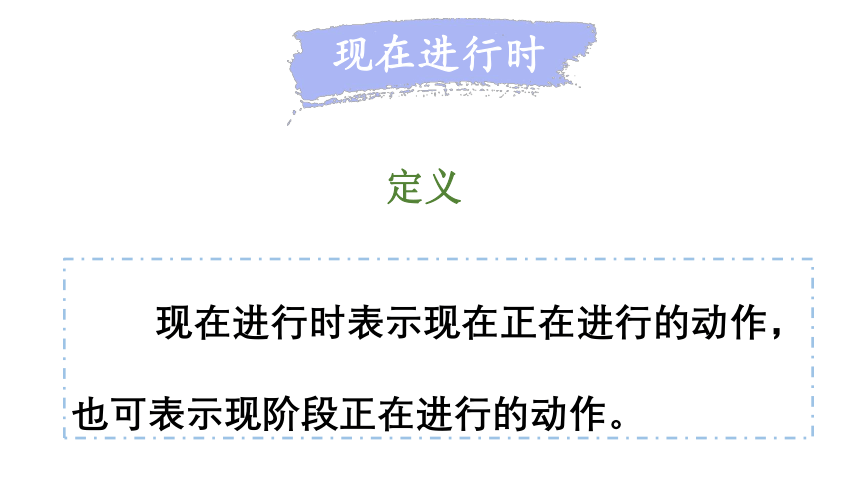
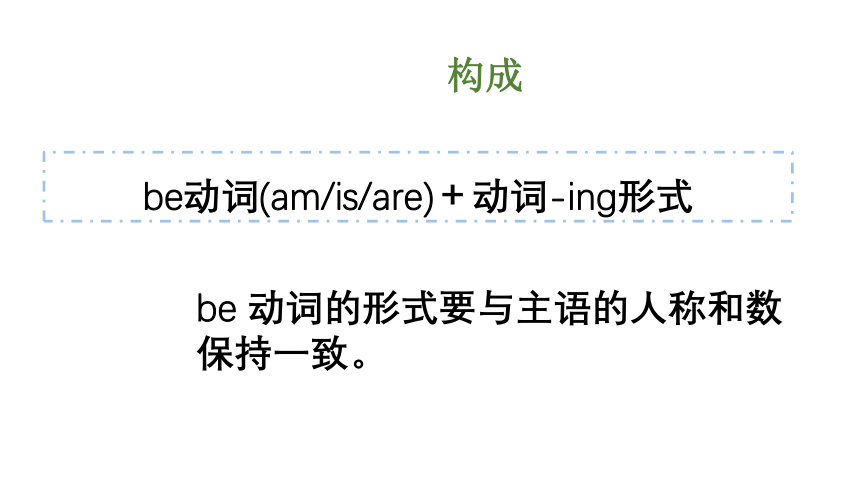
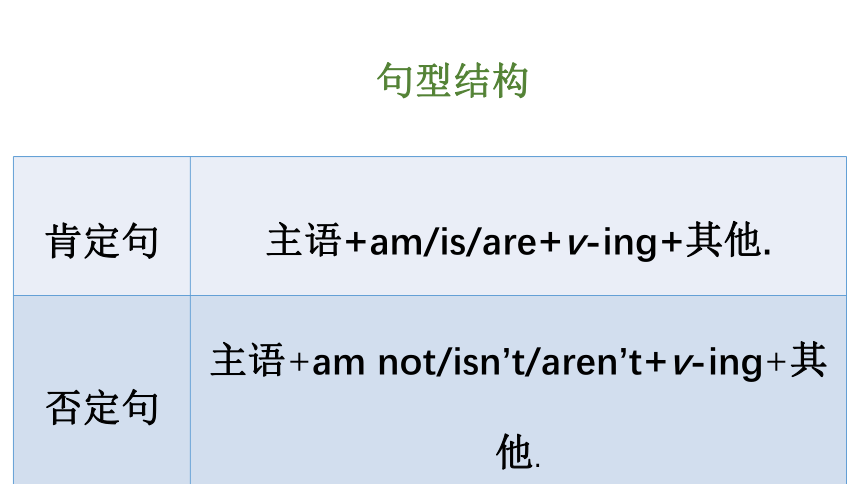
文档简介
(共23张PPT)
Section A (Grammar Focus-3c)
Unit 6 I'm watching TV.
What is she doing
eating
singing
drawing
riding a bike
She ________________.
Lead-in
What are they doing
watching TV
reading
exercising
They ________________.
What is he doing
Is he reading a newspaper
No, he isn’t.
Is he reading a book
Yes, he is.
He is reading a book.
What are you doing I’m watching TV.
What’s she doing She’s washing her clothes.
What are they doing They’re listening to a CD.
Are you doing your homework Yes, I am./No, I’m not. I am cleaning my room.
Is he reading a newspaper Yes, he is./No, he isn’t. He’s playing basketball.
Are they using the computer Yes, they are./No, he aren’t. They’re exercising.
She’s exercising (now).
She exercises (on Mondays/ every night/ in the mornings/ etc.)
I am playing computer games.
He is playing basketball.
She is drawing a picture.
They are reading a book.
请
归
纳
什
么
是
现
在
进
行
时
现在进行时
定义
现在进行时表示现在正在进行的动作,也可表示现阶段正在进行的动作。
构成
be动词(am/is/are)+动词-ing形式
be 动词的形式要与主语的人称和数保持一致。
句型结构
肯定句 主语+am/is/are+v-ing+其他.
否定句 主语+am not/isn’t/aren’t+v-ing+其他.
一般疑 问句 Am/Is/Are+主语+v-ing+其他?
肯定回答:Yes, 主语+am/is/are.
否定回答:No, 主语+am not/isn’t/
aren’t.
特殊疑 问句 特殊疑问词+am/is/are(+主语)+v-ing+其他
verb v-ing verb v-ing
watching using
cleaning making
reading washing
talking exercising
listening
watch
clean
read
talk
listen
use
make
wash
exercise
Look and think
动词原形如何变成现在分词?有什么规律?
v-ing变化规律
一般情况下,在动词词尾直接加-ing do → doing
buy → buying
以不发音的字母e结尾的动词, 去掉e,再加-ing have → having
dance → dancing
以重读闭音节结尾且末尾只有一个辅音字母的动词,双写末尾辅音字母,再加 -ing swim → swimming
shop → shopping
少数以 ie 结尾的动词,变 ie为 y,再加 -ing die → dying
lie → lying
Let’s write
写出下列动词的-ing形式
sing → _______ paint → ________
study → ________ play → _______
write → _______ draw → _______
take → ______ get → _______
begin → _________ put → _______
singing
painting
studying
playing
writing
drawing
taking
getting
beginning
putting
现在进行时与一般现在时的区别
一般现在时表示经常性、习惯性的动作,谓语动词为原形或第三人称单数形式,标志性词常为usually, often, sometimes, on Monday, every day等。
现在进行时表示现在正在进行或发生的动作。谓语动词为be + v-ing, 标志性词常为now, right now, at the moment等。
Linda a shower now.
Linda a shower in the morning.
usually takes
is taking
Exercise
1. Look! The boys _________ (play) basketball on
the playground.
2. My father __________(read) books after dinner.
3. In the morning, Mr. Smith __________(get) up
at seven o’clock.
4. Listen! Linda ________(sing) in the next room.
is playing
reads
gets
is singing
根据语境及括号内的动词填空。
5. His brother usually __________(do) homework
at school.
6. They __________(go) shopping every Friday
evening.
7. Her sister __________(eat) dinner now.
8. On weekends Aunt Beth __________(walk)
with her pet dog.
does
go
is eating
walks
Write sentences following the examples.
1. Jenny/ clean the house/ now
__________________________________
2. Bob/ make dinner/every Saturday
___________________________________
3. Mary’s parents/ drink tea/after dinner
____________________________________
4. Bill/ talk on the phone/now
____________________________________
5. Becky and Bob/ watch TV/on weekends
_____________________________________
Jenny is cleaning the house now .
Bob makes dinner every Saturday.
Mary’s parents drink tea after dinner.
Bill is talking on the phone now .
Becky and Bob watch TV on weekends .
3a
Number the sentences in order to make a telephone conversation. Then practice it with a partner.
Do you want to go tomorrow then
OK. See you tomorrow evening!
I’m reading a book.
Let’s go at seven o’clock.
No, this book is really interesting.
What are you doing
Do you want to go to the movies now
Sure, what time
1
2
3
4
5
6
7
8
3b
Take turns miming different activities in your group. The others in the group guess what the activities are.
3c
1. I look at the blackboard.
2. We drink tea.
3. He and I do our homework.
Ⅰ. 把下列句子变为进行时态。
I am looking at the blackboard.
We are drinking tea.
He and I are doing our homework.
Exercises
按要求完成句子,每空一词。
1.He is doing his homework. (改为一般疑问句)
______ he ______ his homework
2.She is singing an English song. (对画线部分提问)
______ is she ______
3.Are you reading a newspaper (作肯定回答)
Yes, ______ ______.
Is doing
What doing
I am
4.He cleans his room every morning. (用now改写句子)
He _______ _______ his room now.
5.David is sleeping in his room. (改为否定句)
David _______ _______ in his room.
is cleaning
isn’t sleeping
Section A (Grammar Focus-3c)
Unit 6 I'm watching TV.
What is she doing
eating
singing
drawing
riding a bike
She ________________.
Lead-in
What are they doing
watching TV
reading
exercising
They ________________.
What is he doing
Is he reading a newspaper
No, he isn’t.
Is he reading a book
Yes, he is.
He is reading a book.
What are you doing I’m watching TV.
What’s she doing She’s washing her clothes.
What are they doing They’re listening to a CD.
Are you doing your homework Yes, I am./No, I’m not. I am cleaning my room.
Is he reading a newspaper Yes, he is./No, he isn’t. He’s playing basketball.
Are they using the computer Yes, they are./No, he aren’t. They’re exercising.
She’s exercising (now).
She exercises (on Mondays/ every night/ in the mornings/ etc.)
I am playing computer games.
He is playing basketball.
She is drawing a picture.
They are reading a book.
请
归
纳
什
么
是
现
在
进
行
时
现在进行时
定义
现在进行时表示现在正在进行的动作,也可表示现阶段正在进行的动作。
构成
be动词(am/is/are)+动词-ing形式
be 动词的形式要与主语的人称和数保持一致。
句型结构
肯定句 主语+am/is/are+v-ing+其他.
否定句 主语+am not/isn’t/aren’t+v-ing+其他.
一般疑 问句 Am/Is/Are+主语+v-ing+其他?
肯定回答:Yes, 主语+am/is/are.
否定回答:No, 主语+am not/isn’t/
aren’t.
特殊疑 问句 特殊疑问词+am/is/are(+主语)+v-ing+其他
verb v-ing verb v-ing
watching using
cleaning making
reading washing
talking exercising
listening
watch
clean
read
talk
listen
use
make
wash
exercise
Look and think
动词原形如何变成现在分词?有什么规律?
v-ing变化规律
一般情况下,在动词词尾直接加-ing do → doing
buy → buying
以不发音的字母e结尾的动词, 去掉e,再加-ing have → having
dance → dancing
以重读闭音节结尾且末尾只有一个辅音字母的动词,双写末尾辅音字母,再加 -ing swim → swimming
shop → shopping
少数以 ie 结尾的动词,变 ie为 y,再加 -ing die → dying
lie → lying
Let’s write
写出下列动词的-ing形式
sing → _______ paint → ________
study → ________ play → _______
write → _______ draw → _______
take → ______ get → _______
begin → _________ put → _______
singing
painting
studying
playing
writing
drawing
taking
getting
beginning
putting
现在进行时与一般现在时的区别
一般现在时表示经常性、习惯性的动作,谓语动词为原形或第三人称单数形式,标志性词常为usually, often, sometimes, on Monday, every day等。
现在进行时表示现在正在进行或发生的动作。谓语动词为be + v-ing, 标志性词常为now, right now, at the moment等。
Linda a shower now.
Linda a shower in the morning.
usually takes
is taking
Exercise
1. Look! The boys _________ (play) basketball on
the playground.
2. My father __________(read) books after dinner.
3. In the morning, Mr. Smith __________(get) up
at seven o’clock.
4. Listen! Linda ________(sing) in the next room.
is playing
reads
gets
is singing
根据语境及括号内的动词填空。
5. His brother usually __________(do) homework
at school.
6. They __________(go) shopping every Friday
evening.
7. Her sister __________(eat) dinner now.
8. On weekends Aunt Beth __________(walk)
with her pet dog.
does
go
is eating
walks
Write sentences following the examples.
1. Jenny/ clean the house/ now
__________________________________
2. Bob/ make dinner/every Saturday
___________________________________
3. Mary’s parents/ drink tea/after dinner
____________________________________
4. Bill/ talk on the phone/now
____________________________________
5. Becky and Bob/ watch TV/on weekends
_____________________________________
Jenny is cleaning the house now .
Bob makes dinner every Saturday.
Mary’s parents drink tea after dinner.
Bill is talking on the phone now .
Becky and Bob watch TV on weekends .
3a
Number the sentences in order to make a telephone conversation. Then practice it with a partner.
Do you want to go tomorrow then
OK. See you tomorrow evening!
I’m reading a book.
Let’s go at seven o’clock.
No, this book is really interesting.
What are you doing
Do you want to go to the movies now
Sure, what time
1
2
3
4
5
6
7
8
3b
Take turns miming different activities in your group. The others in the group guess what the activities are.
3c
1. I look at the blackboard.
2. We drink tea.
3. He and I do our homework.
Ⅰ. 把下列句子变为进行时态。
I am looking at the blackboard.
We are drinking tea.
He and I are doing our homework.
Exercises
按要求完成句子,每空一词。
1.He is doing his homework. (改为一般疑问句)
______ he ______ his homework
2.She is singing an English song. (对画线部分提问)
______ is she ______
3.Are you reading a newspaper (作肯定回答)
Yes, ______ ______.
Is doing
What doing
I am
4.He cleans his room every morning. (用now改写句子)
He _______ _______ his room now.
5.David is sleeping in his room. (改为否定句)
David _______ _______ in his room.
is cleaning
isn’t sleeping
同课章节目录
- Unit 1 Can you play the guitar?
- Section A
- Section B
- Unit 2 What time do you go to school?
- Section A
- Section B
- Unit 3 How do you get to school?
- Section A
- Section B
- Unit 4 Don't eat in class.
- Section A
- Section B
- Unit 5 Why do you like pandas?
- Section A
- Section B
- Unit 6 I'm watching TV.
- Section A
- Section B
- Review of Units 1-6
- Unit 7 It's raining!
- Section A
- Section B
- Unit 8 Is there a post office near here?
- Section A
- Section B
- Unit 9 What does he look like?
- Section A
- Section B
- Unit 10 I'd like some noodles.
- Section A
- Section B
- Unit 11 How was your school trip?
- Section A
- Section B
- Unit 12 What did you do last weekend?
- Section A
- Section B
